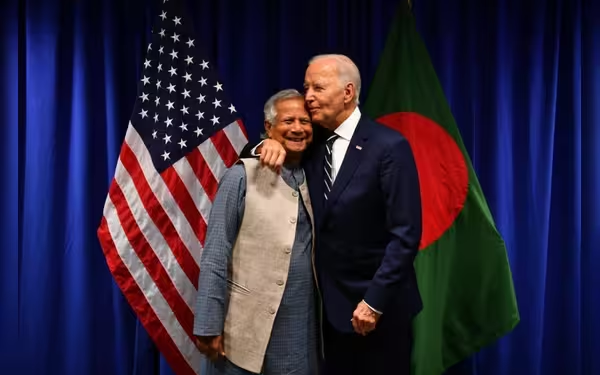Sunday, October 6, 2024 04:23 AM
Bangladesh Strengthens Ties with the United States
- Bangladesh seeks US partnership for economic support.
- Yunus administration faces challenges in diplomacy.
- India's stance complicates Bangladesh's foreign relations.
 Image Credits: asiatimes
Image Credits: asiatimesBangladesh embraces a partnership with the US amid economic challenges and political changes under the Yunus administration.
In recent times, Bangladesh has found itself at a crossroads, as it embraces a new partnership with the United States. This shift comes at a time when the country is grappling with economic challenges and political changes. The interim government, led by Chief Advisor Mohammad Yunus, is looking to strengthen ties with Washington, which is keen on enhancing its influence in the Indian Ocean Region. This relationship is not just about politics; it is also about commerce and mutual growth.
Bangladesh, a rapidly growing economy located on the Bay of Bengal, is in dire need of financial support. The country is facing dwindling foreign exchange reserves, a situation exacerbated by the previous administration's mismanagement. On the other hand, the United States, under President Joe Biden, is eager to solidify its strategic foothold in the Indo-Pacific region. The US has previously played a crucial role in supporting the movement that led to the ousting of Bangladesh's former autocratic leader, and now sees the Yunus administration as a fresh opportunity for collaboration.
However, this budding partnership is not without its challenges. The new government, composed of professionals from various NGOs, may lack the necessary experience in statecraft and diplomacy to effectively navigate the complexities of international relations. As Bangladesh seeks to capitalize on this opportunity, it must first focus on strengthening its political institutions and ensuring economic stability. The stakes are high; failure to achieve stability could lead to further economic decline and political chaos, which would ultimately benefit China. Beijing has a vested interest in disrupting Bangladesh's democratization process.
Moreover, India, despite being a US ally, has its own agenda. New Delhi opposed the removal of former Prime Minister Sheikh Hasina, who was seen as a key ally in the region. This adds another layer of complexity to Bangladesh's situation, as it must balance its relationships with both the US and India while pursuing its own national interests.
While the partnership between Bangladesh and the United States holds significant promise, it is essential for the Yunus administration to address internal and external challenges effectively. By focusing on political stability and economic recovery, Bangladesh can not only secure its future but also play a pivotal role in the evolving dynamics of the Indo-Pacific region. The road ahead may be fraught with difficulties, but with careful navigation, Bangladesh can emerge stronger and more resilient.













